You can take your pick of standout performances from Colorado’s shocking 45-42 Week 1 upset over TCU. There was Shedeur Sanders with 510 yards through the air, Travis Hunter’s workmanlike 129 snaps, 119 receiving yards on 16 targets with an acrobatic interception. There were even circus catches downfield by Jimmy Horn Jr. and Xavier Weaver. But the leading receiver wasn't a receiver at all, but rather freshman running back Dylan Edwards.
Offensive coordinator Sean Lewis used Edwards to unlock TCU’s defense, exploiting the Frogs’ linebackers and getting the shifty 5’8” playmaker in space in different ways in the flats, where he proved to be absolutely deadly with 135 receiving yards on five catches with four total touchdowns, including a 75-yard screen we’ll get to a little bit later. First, take a look at how one of Colorado’s first snaps of the game foreshadowed how big a role Edwards would play in his college debut.
The Colorado receiver releases up the field and because of the logjam it creates, the second defender isn’t able to get through traffic to cover Edwards in the flat.
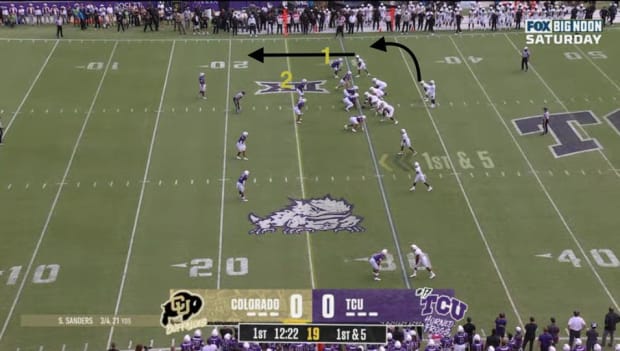
Edwards is wide open, and Sanders hits him for a short gain, but the young back loses his footing and tweaks his leg, which is the only reason it wasn’t a potentially bigger play.
“He thought it popped,” Deion Sanders said after the game. “I said nah, nah, nah, God wouldn’t have brought you this far for that. Not right now. Watch the impact you’re gonna have on this game, and he had a tremendous impact.”
Whether the credit belongs to divine intervention, a youthful ability to bounce back, or good work by CU’s training staff, Sanders was right about just what his running back would do for the rest of the game.
What a debut at the college level for @DerbyPanther alum Dylan Edwards. 4 touchdowns, the final one the game winner for Colorado to knock off TCU. Ends with 5 catches for 135 yards out of the backfield pic.twitter.com/qQhlieBVOo
— Catch It Kansas (@CatchItKansas) September 2, 2023
In fact, his impact would be felt just a few plays later in a similar fashion, this time on the other side of the field. It’s unclear which defender was responsible for Edwards on this play, but what is clear is that he got lost in the shuffle as two Colorado receivers (one just off screen) create a void by running routes into the end zone. TCU safety Josh Foster (who’s walked up onto the line of scrimmage) ends up rushing Shedeur Sanders, while LB Johnny Hodges behind him gets caught in the traffic and doesn’t do much of anything. Edwards walks in untouched.
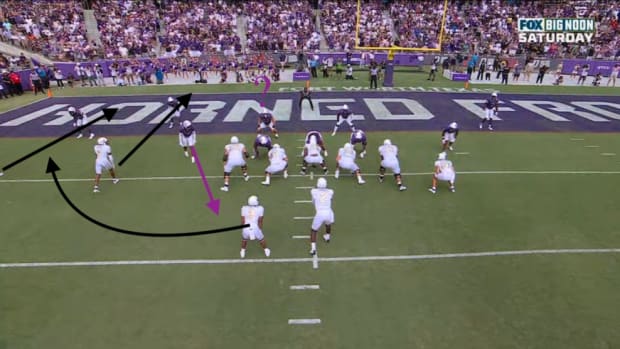
… and TCU safety Bud Clark realizes someone messed up when it’s far too late.
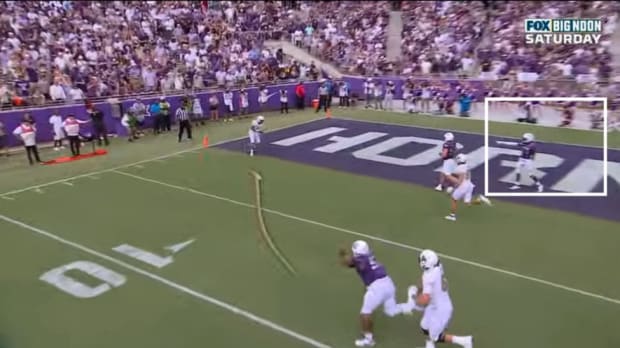
One thing that’s often questioned about skill players is their willingness to block. They don’t have to be road graders, but they do have to be up to the task, because when they are it adds a significant dimension to an offense by allowing plays to be even more explosive thanks to perimeter blocking. It showed on Edwards 75-yard touchdown on a screen pass.
One interesting aspect of Colorado’s offense is the significantly wide splits by the receivers, where the widest players are nearly on the sideline before the snap, something that’s becoming increasingly more popular across college football. It means there’s more space to play with, and the Buffs exploit that using Edwards’ speed.
But this play might have been dead to rights from the outset. TCU doesn’t have it defended perfectly on the outside, but the Frogs at least force Edwards back into the middle of the field where, theoretically, they have help. Except they don’t, because tight end Michael Harrison has taken care of linebacker Jamoi Hodge.
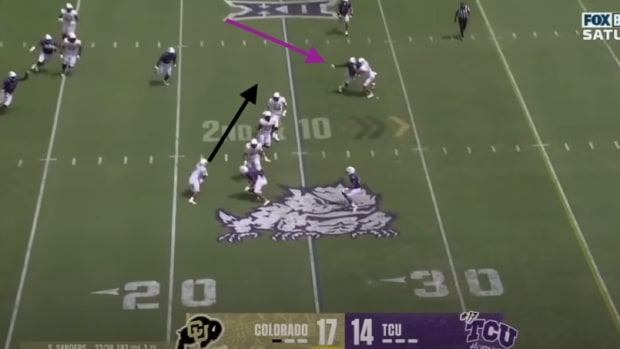
It’s enough to get Edwards into open space, where blocks on the edge down the field are able to spring him for a score.
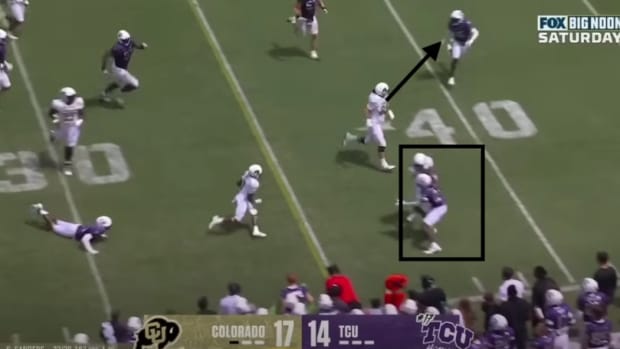
The running back catching the ball out of the backfield isn’t exactly a staple of a Lewis offense. In fact, the most receptions for a running back in a Lewis-led offense at Kent State—where he was the head coach from 2018 to ‘22—was Justin Rankin in ‘18, who finished the year with 14 catches. Even the talented Marquez Cooper was only targeted 14 times out of the backfield last year for Kent State with eight catches, one of which was a 27-yard gain against Georgia last season that was virtually the same screen play as shown here.
But it’s clear that Edwards may be of much more use as a receiving threat than previous backs in Lewis’ system, especially if other opponents defend as poorly as TCU did in Week 1. Edwards’ final score showed once again how sometimes a play’s success has as much to do with how the defense reacts as it does with the offense’s own efficiency.
TCU brings a fourth rusher from the second level, but Sanders calmly handles it because he knows he has Edwards as an outlet. Edwards runs right into the space the blitzer vacated and ends up in a footrace to the corner with Hodge. That’s already disadvantageous for a linebacker, then you add in the fact that he’s a tick late in realizing what’s happening, and the penalty is six points for the Buffs and the game-winning score to cap off Edwards’ electric day.
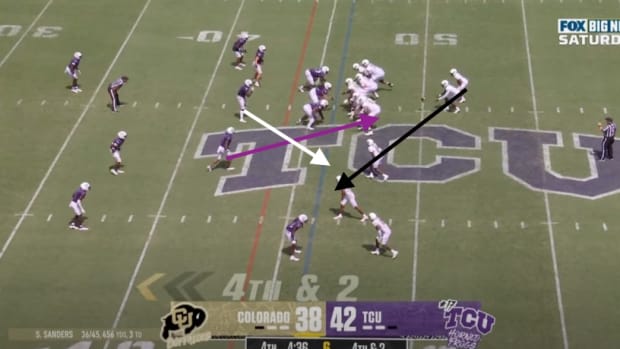
The debut was impressive for so many different players in Colorado’s win, but the freshman running back showed the full breadth of what the group of skill players Deion Sanders has assembled can do. It’s not just defending the receivers down the field in the vertical passing game, but also closer to the line of scrimmage, where Edwards shows you have to defend the width of the field against this team or run the risk of watching him run roughshod again.






